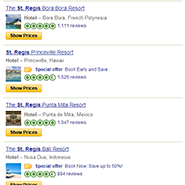- About
- Subscribe Now
- New York,
October 20, 2014

 Search results for St. Regis on TripAdvisor
Search results for St. Regis on TripAdvisor
The United States still accounts for more than half of the online search for luxury hotels, but searches in countries such as China are rapidly increasing, according to a report by the Digital Luxury Group.
Search volume has become a statistically significant indicator of sold rooms, making it imperative for hotel brands to boost their visibility on various search engines. Indeed, search is repeatedly turned to throughout a consumer's purchasing journey and can often be the decisive factor in nudging a reservation.
“Such a significant increase in interest for luxury hotels from China can be attributed to a few things," said David Sadigh, founder and CEO of Digital Luxury Group, Geneva.
"Firstly, numerous western hotel brands are opening in second, third and fourth-tier cities, building brand awareness in parts of China where wealth is increasing and overall luxury hotel awareness may be low," he said.
"This could mean that – after experiencing a particular brand in their home country – Chinese tourists are now seeking out this brand when they travel abroad.”
The "World Luxury Index Hotels 2014" report covers 70 hotel brands, more than 900 destinations and includes data from more than 485 million searches across key search engines such as Google and Baidu. Digital Luxury Group worked with professor Samad Laaroussi, the chair of luxury hospitality of The Lausanne Hotel School, on the report.
The report divides the studied hotels in three categories: "Luxury exclusive," "Luxury major" and "Upper upscale."
Beginning, middle and end
A consumer might begin their journey with a search, return to another search awhile later and then ultimately commit to a reservation with a final sale. Essentially, online search engines have become gatekeepers of sales.
Searches for luxury exclusive hotels constituted 19 percent of the total, but grew 9.6 percent from the year-ago period.
Luxury major hotels received 25 percent of total searches and grew 5.9 percent from the year-ago period. Upper upscale properties accounted for 56 percent of searches and grew 7.9 percent from the year-ago period.
Ritz-Carlton Facebook post
The United States produced 58 percent of global searches, up 7 percent from the year-ago period. Major growth countries included China at 39 percent, the United Arab Emirates at 16 percent and India at 12 percent.
Search interest declined in Germany, France and Thailand, and remained unchanged in the United Kingdom.
Some of the most sought-after brands include the Four Seasons and The Ritz-Carlton, both of which netted top 10 spots.
Four Seasons Beijing
Other notable luxury brands in the top 50 include Fairmont at 14, Mandarin Oriental at 18, Peninsula at 20 and St. Regis at 21.
While search is just one component of a consumer's path to purchase, evidence demonstrates that consumers who search are likely to book.
Indeed, DLG says that there is 99.9999 percent probability that search volume is correlated with the number of rooms sold.
Competition galore
Hotel brands are increasingly squeezed by the metasearch dominance of online travel agencies and Google, according to a new report by L2.
The Metasearch Insight Report argues that hotel brands must invest heavily in the big metasearch players, TripAdvisor, Kayak and Google, in order to stay relevant. Brands that gain top placement within these search engines see dramatic increases in Web site traffic (see story).
With all six of its indexed brands netting top 10 rankings in L2′s latest report, Starwood Hotels and Resorts demonstrates that portfolios can evenly employ digital innovations across brands.
The report depicts the increasingly complex digital landscape that hotel brands must navigate and argues that digital proficiency is a major differentiating factor. As travel firms, search engines and marketplaces pursue larger shares of the travel market, hotels will be pressed to keep guests from defecting (see story).
"Thanks to STR and DLG data, the search interest proved to be a good predictor of rooms sold and RevPAR," said Samad Laaroussi, holder of the chair of luxury hospitality of Ecole Hôtelière de Lausanne, Lausanne, Switzerland.
"There are many potential implications for marketing and revenue management," he said.
Final Take
Joe McCarthy, staff reporter on Luxury Daily, New York
Share your thoughts. Click here